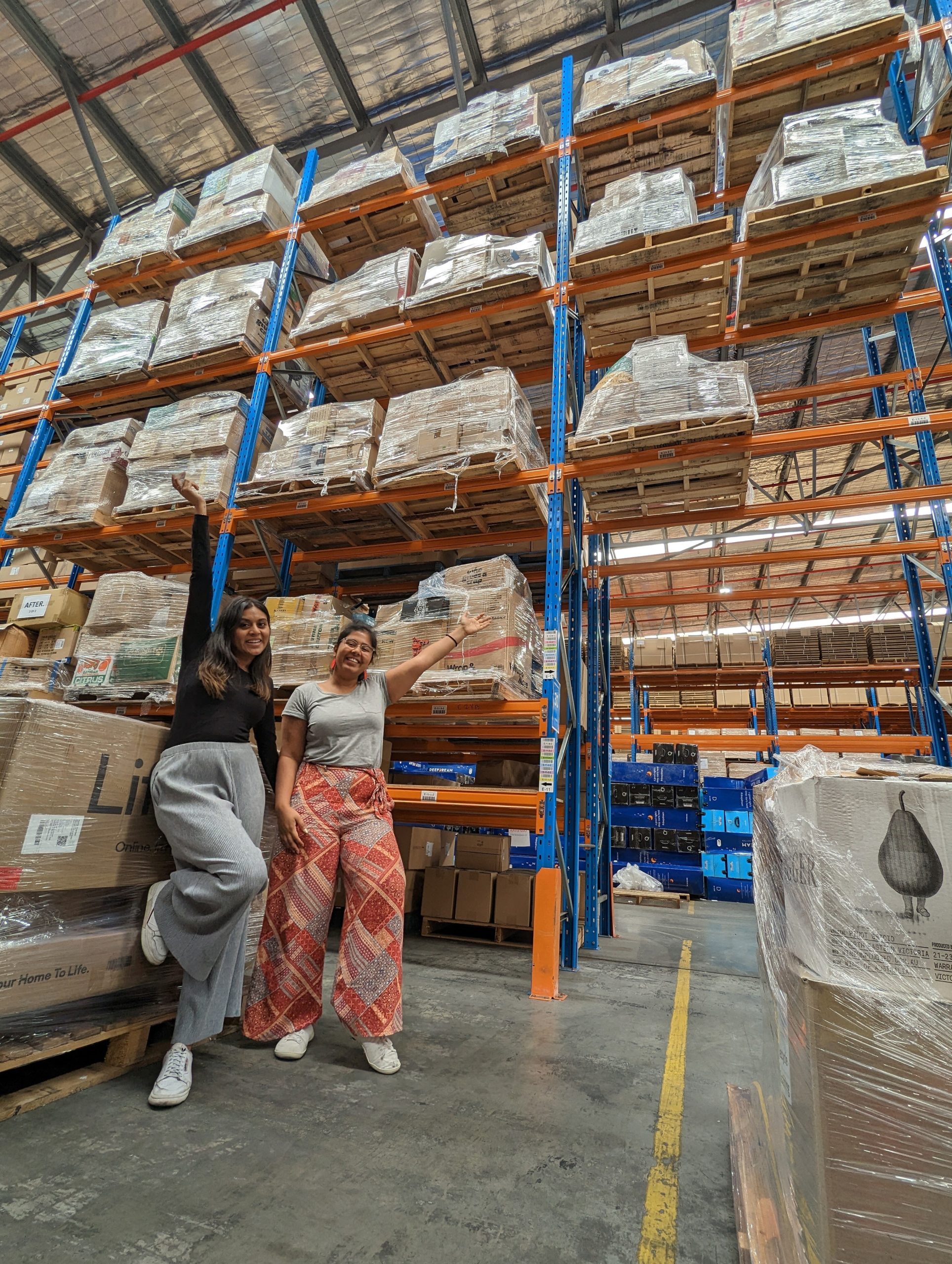
Susan Tait has been making furniture in Thomastown in Melbourne’s north for 32 years.
Every year, she and her husband were sending 500 kilograms of wasted fabric to landfill.
“Someone said that’s the size of a one-year-old elephant,” joked Tait.
“We’ve always tried to be as sustainable as possible while manufacturing locally.”
READ MORE: Company that offered to reserve parking spots fined nearly $11m
“But we didn’t really have any solution for fabric.”
That changed in January 2023 when Tait found after.
She was hunting for a solution online when she stumbled across ‘Australia’s first textile recycling pick-up and reward service.’
“That was a really big peace of mind for us.”
“The girls have managed to partner with enough people so you can actually just send the entire upholstery cover to them including zips, buttons, tags, every part.”
Those girls are Yesha Patel and Nehal Jain, who teamed up in 2022 after Yesha became frustrated with the lack of options she had to recycle old, unwearable clothes.
READ MORE: Hannah bought her first home on her own at 25, thanks to being a ‘cheapskate’
“As someone who used to buy a lot of fast fashion, I had a lot of clothes in my wardrobe that were quite unwearable.”
“It felt wrong to send them to an op shop because they were really worn out.”
“I didn’t know what to do with them and I felt lost. I went online but there was hardly anything there; especially things that I could do as a consumer.”
Australians buy more clothes per person than any other country in the world.
The average Australian will buy 56 new items of clothing every year. As a country, we throw out 300,000 tonnes of clothing.
A total of 200,000 tonnes of that is going to landfill. The other 100,000 tonnes are being sent overseas to countries that do not have the facilities or expertise to properly recycle textiles.
“We don’t have – any at scale – recycling infrastructure that does fibre to fibre [in Australia],” Patel said.
“We’re big on keeping textiles at their highest possible value. We don’t want to turn it into insulation, we want to recycle it into new yarn and that’s what we cannot do right now in Australia.”
Since launching with a five-kilometre limit in the middle of a COVID-19 lockdown, after has expanded its collection service across metro Melbourne, Sydney and Auckland and diverted more than 11 tonnes of textile waste from landfill.
Mum of two, Elly Ackland, was one of their first customers after finding the start-up via a local Facebook group.
“I really liked the idea of knowing that stuff which I couldn’t use anymore – and that I didn’t think anybody else would really want to use – could actually be dealt with properly and not just not just go off to landfill; which just makes me feel sick, quite frankly,” said Elly.
“I wear things until they fall to bits. I hate overconsumption.
“I’m prepared to pay a small amount – it’s not a lot of money – if it’s going to guarantee that this is getting done properly. That’s something that I’m prepared to invest in.”
After charges $20 to collect five kilograms of textile waste from your front door.
The team schedules monthly collections and the more you recycle, the cheaper it gets.
“Recycling is not free so cost has definitely been a challenge for us,” explains Yesha.
The bigger challenge, she explains, is a lack of Australian expertise in turning textile waste into yarn that can be reused.
“We are relying on people in India, because they have access to more labour, infrastructure and the global market for recycled products,” she said.
“It’s not ideal because of transportation there, but our goal is to really interact and learn from what they’re doing.”
“If it’s got life in it, if it’s still good enough to wear or if an item can still be repaired, don’t give it to us.
“[Wvery] household and individual has old towels or bedding they put in the bin, or kids that grow out of clothes that have been torn or worn out. That’s where we are here to help.”
The team at after have been calling for the Australian government to do more in tackling the problem and invest in options to recycle textiles locally.
Unlike France, which has introduced a $16 tax on fast fashion, Australia has opted for a voluntary, four cent tax which retailers are not obligated to pay.
All of that money will go to Seamless; a not-for-profit organisation pushing for a circular fashion economy by 2030.
Tait believes that customers are already driving that change.
“We’re also seeing fabric houses creating new fabric from recycled yarn, and we’re also seeing a great interest from the market – people requesting it and willing to pay a little bit more for it.”
“That’s really satisfying.”
“It’s not only something we are passionate about, but it’s exciting to see it become good business.”
links to content on ABC
9News





